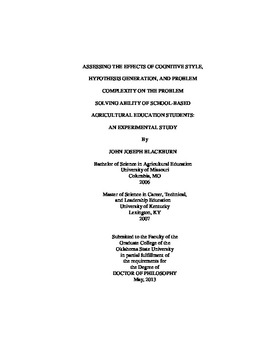Assessing the Effects of Cognitive Style, Hypothesis Generation, and Problem Complexity on the Problem Solving Ability of School-Based Agricultural Education Students: An Experimental Study
Assessing the effects of cognitive style, hypothesis generation, and problem complexity on the problem solving ability of school-based agricultural education students: An experimental study
| dc.contributor.advisor | Robinson, J. Shane | |
| dc.contributor.author | Blackburn, John Joseph | |
| dc.date.accessioned | 2014-09-24T14:16:27Z | |
| dc.date.available | 2014-09-24T14:16:27Z | |
| dc.date.issued | 2013-05 | |
| dc.identifier.uri | https://hdl.handle.net/11244/10958 | |
| dc.description.abstract | Problem solving is one of the most important cognitive abilities possessed by people. Further, the ability to solve problems is one of the most important characteristics of potential employees sought by employers in the agriculture industry. The purpose of this study was to assess the effects of cognitive style, hypothesis generation, and problem complexity on the problem solving ability of students in Agricultural Power and Technology courses in Oklahoma. Specifically, students were asked to troubleshoot a small gasoline engine with a known fault. Kirton's Adaption-Innovation Inventory was used to determine students' cognitive style as more adaptive or more innovative. This study employed a CRF-22 design where students were assigned randomly by cognitive style to treatment groups. The treatment was complexity of the problem, either simple or complex. Students received instruction in small gasoline engines from their respective agriculture teachers, who had attended a small gasoline engines workshop, prior to troubleshooting. Additionally, students were required to generate a written hypothesis over their assigned problem. Students' content knowledge was assessed using a criterion-referenced test. A two-way independent ANOVA was calculated and no statistically significant differences in knowledge existed based on cognitive style and hypothesis generation. A three-way independent ANOVA was utilized to determine if statistically significant differences existed in students' time to solution based on the independent variables. The three-way interaction effect was not statistically significant. The two-way interaction effect of problem complexity and cognitive style was not statistically significant. Likewise, the two-way interaction effect of hypothesis generation and cognitive style was not statistically significant. It was concluded that students can solve problems regardless of their cognitive style. The two-way interaction effect of problem complexity and hypothesis generation was statistically significant. This finding indicated that the students who generated a correct hypothesis solved their problems more efficiently, regardless of complexity. It was recommended that agriculture teachers teach their students to generate hypotheses when solving problems. Additionally, it was recommended that further research be conducted to clarify the relationship of content knowledge, hypothesis generation, and cognitive style on the ability of students to solve problems of varying complexities. | |
| dc.format | application/pdf | |
| dc.language | en_US | |
| dc.rights | Copyright is held by the author who has granted the Oklahoma State University Library the non-exclusive right to share this material in its institutional repository. Contact Digital Library Services at lib-dls@okstate.edu or 405-744-9161 for the permission policy on the use, reproduction or distribution of this material. | |
| dc.title | Assessing the Effects of Cognitive Style, Hypothesis Generation, and Problem Complexity on the Problem Solving Ability of School-Based Agricultural Education Students: An Experimental Study | |
| dc.title | Assessing the effects of cognitive style, hypothesis generation, and problem complexity on the problem solving ability of school-based agricultural education students: An experimental study | |
| dc.contributor.committeeMember | Terry, Robert, Jr. | |
| dc.contributor.committeeMember | Kelsey, Kathleen D. | |
| dc.contributor.committeeMember | Fuqua, Dale | |
| osu.filename | Blackburn_okstate_0664D_12775.pdf | |
| osu.accesstype | Open Access | |
| dc.type.genre | Dissertation | |
| dc.type.material | Text | |
| thesis.degree.discipline | Agricultural Education | |
| thesis.degree.grantor | Oklahoma State University |
Files in this item
This item appears in the following Collection(s)
-
OSU Dissertations [11222]
